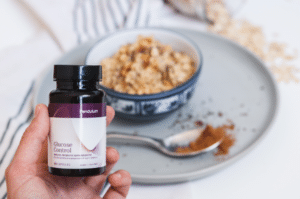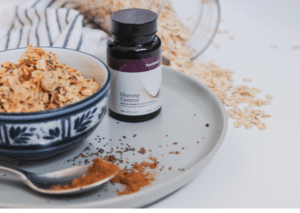 Eat Empowered
Eat Empowered  Gut Health
Gut Health  Wellness Advice from Experts
Wellness Advice from Experts
How Gut Health Impacts Blood Sugar
Home » Eat Empowered » Gut Health » How Gut Health Impacts Blood Sugar
Created in partnership with Pendulum
How we keep our digestive system in tip-top shape, and improve our overall health, is one of the hottest topics in wellness. There are countless studies and articles about the importance of taking care of our tummies and the impact it has on our overall health. Our gut influences everything from heart disease to arthritis to cancer.
Now, research has found that gut health—or lack thereof—may be linked to type 2 diabetes.
The Centers for Disease Control and Prevention (CDC) found that 1 in 10 people have diabetes, with about 90 percent having type 2 diabetes. Someone who has type 2 diabetes can’t process blood sugar effectively because they’re not responding to insulin or their bodies aren’t producing enough. And this means that people living with type 2 diabetes are at greater risk for heart disease, nerve damage, kidney issues, eye damage, hearing impairment, sleep apnea, and Alzheimer’s disease.
WHAT THE HECK IS BLOOD SUGAR ANYWAY?
Now, we’re about to get our science on, so stick with us here. We promise you’ll thank us.
After we eat a meal, our bodies get busy breaking down food to be used as energy or to be stored as fat. After the food is broken down we are left with glucose, the simplest form of sugar. A hormone called insulin gets released from our pancreas and starts traveling through our bloodstream looking for the glucose to bring into our cells.
Picture this: imagine all the sugar in our blood has a little padlock attached to it, and the only way to get the sugar in our cells for energy is to unlock it. Insulin is the only key we have for this padlock. People with type 2 diabetes produce little to no insulin, or over time, they become resistant to the insulin they are producing. The key no longer fits in the lock. Therefore, their cells are starving for energy and screaming “feed us, feed us!”
In an attempt to quiet them down, the pancreas keeps pumping out more and more insulin, but it’s just not fitting in the padlock. When this happens, there is no way to get the sugar out of the blood and into the cells for energy. This causes high blood sugar levels, which is the trademark symptom of diabetes.
HOW OUR GUT MICROBIOME WORKS—AND WHY IT’S IMPORTANT
Now that we’ve gone over blood sugar, let’s dig into the gut microbiome. Whether you’ve heard it called microbiome or flora, the bacteria in the gut play a role in everything from weight management to cognitive functioning and immunity to digestion.
In your gut, there are billions of bacteria, viruses and fungi. Billions. You’re hosting colonies and armies of microscopic bugs which we collectively call microbes. This is what’s known as your microbiome. These microbes are essential to your immune system, heart, lungs, skin, and gut.
The foods you eat help to diversify the microbes in your GI tract. This is GOOD. You want lots of different bacteria, viruses, and fungi to have a nice rainbow of microbes that will help to keep you healthy and in fine tune.
Research is looking at how diverse and rich your microbiome is as it relates to several areas:
- Weight Management: There is really good research out there, even twin studies that find that the more diverse and active the gut microbiome, the better, when it comes to weight management. Microbe imbalance is linked to overweight and obesity intimately.
- Digestive Disorders: Science is linking digestive disorders like IBS and leaky gut to microbiome imbalance. Introduction of a higher fiber diet and more diversity in foods as well as probiotic rich foods (like kefir and sauerkraut) can help to manage symptoms and prevent flare ups.
- Heart Health: There’s evidence showing that probiotics (from food and supplementation) may be beneficial to your heart by lowering total and LDL cholesterol.
- Blood Sugar: A rich microbiome may help regulate blood sugar and prevent spikes and crashes.
A NEW APPROACH TO MANAGE DIABETES

While diet and exercise are pivotal to the management of type 2 diabetes, there is a new cutting-edge microbiome company, called Pendulum, that is dedicated to making people healthier through microbiome-targeted solutions. The company’s flagship product, Pendulum Glucose Control, is the first and only medical probiotic that is clinically shown to lower A1C and blood sugar spikes.*
Many with type 2 diabetes have lost beneficial bacterial strains that help digest dietary fiber and produce butyrate, a short-chain fatty acid which plays a key role in the body’s natural ability to signal insulin production, stabilize blood glucose and provide anti-inflammatory properties. That is how digestive health, insulin and diabetes are all connected.
Pendulum has found a way to combine targeted probiotic strains of beneficial bacteria and prebiotics to restore the body’s natural ability to metabolize fiber and manage glucose levels.*

New discoveries in microbiome research indicate that the lost or reduced ability to metabolize fiber and manage blood glucose can be restored by replenishing strains in the gut microbiome. Through DNA sequencing, Pendulum has identified unique, targeted strains of beneficial bacteria that help restore disrupted gut function in people with type 2 diabetes. This medical probiotic can help to metabolize fiber and produce butyrate, and as an added bonus, it can help restore the gut lining.
BOTTOM LINE
Our gut is extremely important in terms of our overall health. While healthy eating and physical activity (and your doctor’s guidance) is paramount to managing type 2 diabetes, this new medical probiotic could be an additional resource for those with type 2 diabetes to help lower A1C* and manage blood sugar spikes through your gut.
What’s even better is that by using the Nutritious Life code, NL33, you can get 30% off your first bottle of Pendulum Glucose Control!
*A nutrition study demonstrated a significant reduction in A1C and blood sugar spikes in people with type 2 diabetes. The study was randomized, double-blinded, placebo-controlled, and across multiple sites in the U.S.
**Consult your physician as part of your total diabetes management plan. Results may vary from person to person.
The Nutritious Life Editors are a team of healthy lifestyle enthusiasts who not only subscribe to — and live! — the 8 Pillars of a Nutritious Life, but also have access to some of the savviest thought leaders in the health and wellness space — including our founder and resident dietitian, Keri Glassman. From the hottest trends in wellness to the latest medical science, we stay on top of it all in order to deliver the info YOU need to live your most nutritious life.
RECENT ARTICLES

Want a sneak peek inside the program?
Get FREE access to some of the core training materials that make up our signature program – Become a Nutrition Coach.
Get Access












































































































































































































































































































































































































































































































































































































































































































































































































































































































































































































































































































































































































































































































































































































































